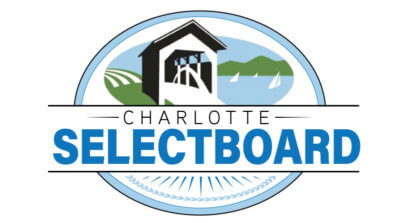Selectboard looks at pros, cons of town manager switch
The selectboard is committed to sharing information with Charlotte residents about the advantages and disadvantages of switching to a town manager form of municipal government versus sticking with a town administrator.
Sharing information about the proposed switch was a goal that members of the selectboard repeatedly promoted at a special meeting to discuss with advocates of the change and other residents the proposed switch on Tuesday, May 23.
 But, as it was eventually pointed out later in the meeting, there is a question of whether it will even matter if residents know about the change.
But, as it was eventually pointed out later in the meeting, there is a question of whether it will even matter if residents know about the change.
Lane Morrison, the de facto leader of a group that has collected enough petition signatures to require a special vote about the proposed change (but has so far delayed submitting that petition in order to negotiate with the board), said he wasn’t sure if informed residents translates into voting residents.
Although he supports continuing to spread information about the pros and cons of having a town manager, Morrison said, there’s already been a lot of information about the issue in town newspapers and social media. “This has been going on for two months.”
The town budget, that was defeated on Town Meeting Day, and the vote on the revised budget, that was passed, both got a lot of impassioned people speaking at selectboard meetings and posting on social media, but few residents voted.
Morrison said it could be apathy or it might be that residents have confidence in the decisions town officials are making.
“I think we need to continue to communicate, but on the other hand, I don’t think we’re going to get 1,300 voters out,” he said.
A town manager is like a CEO, who gives a board of directors more time to work on their company’s policies, direction and major problem solving. A CEO and a town manager handle more day-to-day routine responsibilities, Morrison said..
A town manager has more responsibility than a town administrator to handle things like purchasing issues, contracts, leases, human resource issues and supervision of town buildings. And, Morrison said, if the town completes the transition to making the Charlotte Volunteer Fire and Rescue Service a town department, the selectboard could put a town manager in charge of that.
Various selectboard members have criticized the group of petitioners for raising the town manager issue at this time when so much of their attention has been focused on the budget and then revising it. They have wanted to know: Why now?
Morrison said the group was pushing for a town manager now because current town administrator Dean Bloch is retiring in October. Bloch, who may be second in popularity among Charlotte town officials only to road commissioner Junior Lewis, has reportedly rebuffed all pleas for him to stay on.
Things are getting more complex and look to get even more complex, and Bloch’s retirement makes this a good time to talk about making this change, Morrison said.
He used the selectboard meeting on Monday, the night before, to illustrate his point. That meeting had an agenda with almost 20 items to cover and was scheduled for two and a half hours but took three hours.
He argued that with a town manager selectboard meetings would be shorter. The switch wouldn’t cost any more in salary because, as an experienced town employee, Bloch’s pay is in the average range of town managers’ salaries in Vermont.
Both Shelburne and Hinesburg have town managers and their selectboard meetings usually last only two hours.
“The curb cuts, the $200 refund for the permit,” Morrison said, “I don’t think you guys should be wasting your time on that.”
Other big issues are on the horizon, or even on this side of the horizon, that he believes the selectboard needs to be focused on, include the new town garage and the property reappraisals that are predicted to have many landowners “jumping up and down.”
Board member Louise McCarren was very concerned that the switch would mean elected town officials, like the town clerk, road commissioner or auditors, would report to a town manager. Throughout the meeting, she repeatedly asserted she could not support that.
Morrison assured her that the elected town officials did not need to report to a town manager: “Each municipality is unique, and it’s kind of a negotiation among the selectboard.”
The selectboard can decide what works best and design an organizational chart of authority and responsibility specific to Charlotte.
Alexa Lewis is another member of the group pushing for a town manager, which also includes Jim Hyde, Charles Russell and Peter Joslin. She said one efficiency a town manager would introduce would be in the budget process, describing a process that would begin with the selectboard telling the town manager what its upcoming-year and long-term goals for the town are.
Then, the town manager would have the responsibility of talking to the different departments and committees and developing a tentative budget in line with what their research had found and the selectboard’s wishes.
Joslin said there are a lot of action items in the town plan, only one of which has been completed. Some are marked ongoing and a good many have completion dates that have passed. This is a situation this selectboard has inherited, but it is still the board’s responsibility to get these items done.
“Some of them are pretty minor, and some of them are quite major,” he said.
Among issues that come up over and over, which Joslin thinks the selectboard should have more ability to focus on, are lack of growth in the village districts; lack of housing, particularly for moderate- and lower-income folks; the new town garage; the governance of the fire and rescue service; speeding issues; authorizing events at the town beach; and protecting areas of high public value.
He said a town manager could orchestrate so many things that would free up the selectboard to focus on the future and accomplishing goals that are impossible for them to concentrate on now.
The board appears ready to recruit a person to fill Bloch’s position who could perform the duties of either a town manager or administrator.
Pre-COVID, state statute requires that residents approve a change to a town manager in a special town election by voice vote. However, at this time, board member Frank Tenney said, a voice vote is not required because the governor has not lifted the COVID provision allowing votes by Australian ballot instead of voice vote. He thought, but wasn’t sure, that provision will end in July.
Some people have said they want to have more contact with the selectboard, board member Kelly Devine said. “A town manager is a fundamentally different reporting structure for the citizens.”
“It’s a big decision to make. I don’t feel like it’s my decision,” she said. “I do think that we have to go through a process where we have to hear from folks in Charlotte what they really want.”
And Faulkner said it was wrong to assume that if the town hires a town manager that “magic happens. There’s no magic.”
“You can hire a bad manager; you can hire a bad administrator,” Joslin said. “The important thing is: You make the decision on the direction that you want to go in and hope that you get a good person.”
Although he believes that selectboard meetings would be shorter with a town manager, Tenney believes that would mean less public input on the town manager’s decisions.
Devine agreed it might mean less public input, but she doesn’t personally think that’s a bad thing. Still, she wants to hear if the public thinks it’s a bad thing.
Mike Russell, who made it clear he was not a part of the ad hoc group lobbying for a town manager, said the selectboard has sounded a little defensive and threatened since the petition came along.
It sounded like the board was upset because they were consumed with revising the defeated budget and that was keeping them from thinking about a long-term change to the town structure, Russell said. “That’s exactly why you want to be able to delegate that stuff to somebody.”
He outlined the budget process as having two parts: One is long-term, policy-driven decisions about what the town is trying to accomplish; the other is the nuts and bolts of moving dollars around to make that happen. The second part would be the responsibility of a town manager.
As others had proclaimed earlier in the meeting, Russell said the switch from a zoning board to the development review board “has been a huge success for this town.” This change would be similar and allow the selectboard to work on planning and policy.
Bill Regan also said he was not part of the petition group, but that he would be the third person that night to comment upon how silly it is for the selectboard to be spending so much time on decisions about curb cuts.
As the meeting wound down, it devolved into a confusing conversation with people talking over each other while the board tried to discuss holding another meeting. It seemed like the board would be talking about posting for candidates to fill Bloch’s position the next time it meets about this issue.
Faulkner said the next discussion of the issue would be at the next regular meeting of the selectboard, but the first regularly scheduled meeting of the board is on June 12. However, on the town’s website there is a special meeting scheduled for this coming Tuesday, June 6, to continue the discussion of a town administrator versus a town manager.
Related Stories
Popular Stories
If you enjoy The Charlotte News, please consider making a donation. Your gift will help us produce more stories like this. The majority of our budget comes from charitable contributions. Your gift helps sustain The Charlotte News, keeping it a free service for everyone in town. Thank you.
Andrew Zehner, Board Chair



